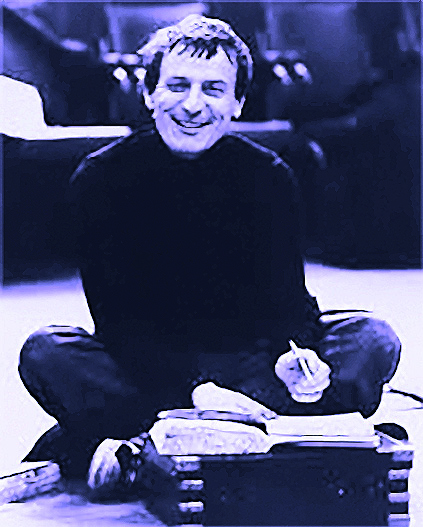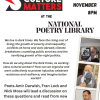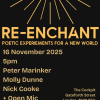
Jenny Farrell discusses Beckett’s Waiting for Godot and its message to us today
Great Carthage waged three wars. It was still powerful after the first, habitable still after the second. Gone without trace after the third. – Brecht, 1951 (transl. JF)
Samuel Beckett died thirty years ago, on 22 December 1989. He received the Nobel Prize for literature, 50 years ago, in 1969. Arguably, Beckett’s most famous play is Waiting for Godot. Typically, when presenting this play today, its comic content is emphasised, as is its ‘absurdist’ label, suggesting that life is meaningless.
Beckett had moved permanently to France in the late 1920s. After the outbreak of WWII, Beckett remained in Paris, where he joined the Resistance following the Nazi invasion of France. He only barely escaped the Gestapo on a number of occasions, and after members of Beckett’s underground resistance group were arrested, he was forced to flee to the unoccupied zone in the South of France, where he continued to support the Resistance.
From 1947 on, Beckett wrote primarily in French. Waiting for Godot, written in 1948, is no exception. The Second World War was just over, and this is a supremely important factor in understanding the play, and one that is rarely recognised.
Although this is not specifically stated, Beckett’s play effectively presents the audience with a post-nuclear-war scene. The stage is practically empty except for a country road and a bare tree. In this landscape, two characters, Vladimir (Didi) and Estragon (Gogo), just about exist. These two men struggle to perform the most elementary actions like taking off a shoe. They sleep rough and are regularly beaten up by gangs at night. This is so commonplace that they barely comment on it. The human experience is reduced to simply staying alive and performing, with effort, the simplest actions. Homo sapiens, it seems, has all but been stripped of the ‘sapiens’ part. The characters even find it difficult to stand upright.
In 1948, after World War II and the nuclear carnage of Hiroshima and Nagasaki, people have almost come to the end of their humanity and any positive human experience. The tree of life is almost barren; in this play, it becomes a possible prop on which to hang oneself.
Traditionally, plays begin with an exposition leading to action, or indeed in the middle of an action. In Waiting for Godot, there is no prospect for action. The first utterance of the play is “Nothing to be done.” The entire play presents us with the two main characters, Didi and Gogo doing nothing and waiting in vain. They have replaced the protagonists of the past – those who struggle against adversity, injustice or attempt to create a meaningful life. Narratives that were once useful to endorse human goodness have all been stripped of their meaning, including a clearly vain hope for God(ot) to arrive. In fact, waiting for God(ot) prevents any movement out of this state.
Past certainties are undermined; theatre as we know it has come to an end. The idea of human perfectibility is finished. The parables of the Bible too are useless. Didi and Gogo hardly remember them. When a boy appears to tell them that Godot is not coming today, Estragon refers to himself as Adam. Humankind has become what Shakespeare’s King Lear refers to when he speaks of the most destitute: a “poor, bare, forked animal”.
Our two protagonists are not defined in class terms. They seem to be vagrants. However, they are not completely alone in the world. Not only do we hear of random violence against them, at two points in the play, once in each act, Pozzo passes through with a slave (Lucky) whom he has tied to a rope and treats like an animal. Pozzo is a nod to the existence of a ‘master’ class, one who has money and still holds slaves. Lucky seems like a version of Prospero’s Caliban in Shakespeare’s The Tempest, the indigenous native of the island, kept ignorant and enslaved by Prospero. In the one, all but incomprehensible, statement made by Lucky, he says: “Given the existence . . .of a personal God … outside (of) time . . . who . . . loves us dearly . . . and suffers . . .with those who . . . are plunged in torment . . . it is established beyond all doubt . . . that man . . . for reasons unknown . . . (has left) labours abandoned left unfinished . . . abandoned unfinished . . .” In other words, God/ man has left labours unfinished.
When Pozzo sees Gogo and Didi, he comments: “You are human beings none the less. … Of the same species as myself. … Made in God’s image!” Any aspiration to godlike form and intellect has been annulled, or perhaps the reverse applies: God is this.
When Pozzo and Lucky appear again in Act II, Pozzo has gone blind and Lucky mute. This is a downward spiral in human development. Thinking is an effort. On one occasion, Didi and Gogo contemplate suicide by hanging from the bare tree (of life?). One reason, they do not do this is that one of them may remain alive and therefore alone. That is a fate worse than death. “I remain in the dark.” This gives some hope. Two characters are after all a small community and they do help each other survive.
Apart from this dependency on another human being, there is another example of common humanity. When Pozzo asks Gogo and Didi for help to get to his feet, they respond to this (after asking for money) “it is not everyday that we are needed.” This profound statement acknowledges that Pozzo’s call for help is addressed to “all of mankind,” and “at this place, at this moment of time, all mankind is us, whether we like it or not.” Ironically, all four men end up on the ground and their cries for help go unheeded. Standing upright has become impossible. Purposeful labour and action no longer define us.
Beckett’s play is of immediate relevance to the world today. Like Brecht, he warns of the ultimate destruction of humanity. However, Beckett leaves us with a sense of that all is not lost. His characters still help each other at times of need, they still have that humanity. The tree bears a few leaves at the end of the play, it is not dead. Yet that hope is tenuous. Will the characters be strong enough to move on? Beckett does not give his audience much hope. There is no progress in the play. All we can do is take this message to heart and change the world.















